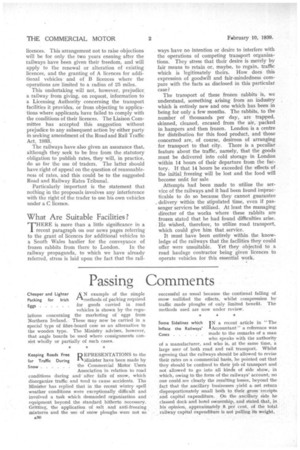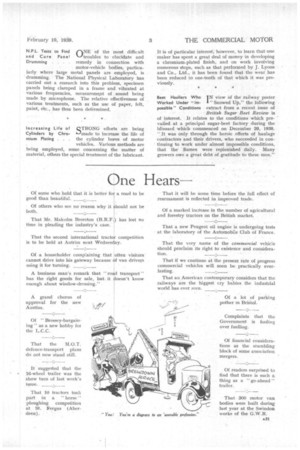Passing Comments
Page 32

Page 33

If you've noticed an error in this article please click here to report it so we can fix it.
Cheaper and Lighter A N example of the simple Packing for Irish rm•methods of packing required Eggs for goods carried in road
vehicles is shown by the regulations concerning the marketing of eggs from Northern Ireland. • These may now be carried in a special type of fibre-board case as an alternative to the wooden type. The Ministry advises, however, that angle boards be used where consignments consist wholly or partially of such cases.
Keeping Roads Free REPRESENTATIONS to the for Traffic Du ring A ‘Zdinister have been made by
Snow the Commercial Motor Users Association in relation to road conditions during and after falls of snow, which disorganize traffic and tend to cause accidents. The Minister has replied that in the recent wintry spell weather conditions were exceptionally difficult and involved a task which demanded organization and equipment beyond the standard hitherto necessary. Gritting, the application of salt and anti-freezing mixtures and the use of snow ploughs were not so *:10 successful as usual because the continual falling of snow• nullified the effects, whilst compression by traffic made ploughs of only limited benefit. The methods used are now under review.
Some Sidelines which IN a recent article in "The Inflate the Railways' Accountant" a reference was Costs made to the remarks of a man who speaks with the authority of a manufacturer, and who is, at the same time, a large user of both road and rail transport. Whilst agreeing that the railways should be allowed to revise their rates on a commercial basis, he pointed out that they should be confined to their job of transport and not allowed to go into all kinds of side show, in which, owing to the form of the railways' account, no one could .see clearly the resulting losses, beyond the fact that the ancillary businesses yield a net return , disproportionately small both to their gross teceipts and capital expenditure. On the ancillary side he classed dock and hotel ownership, and stated that, in his opinion, approximately 8 per cent of the total railway capital expenditure is not pulling its weight. N.P.L. Tests to Find rINE of the most difficult and Cure Panel •--"troubles to elucidate and Drumming . . . . remedy in connection with
motor-vehicle bodies, particularly where large metal panels are employed, is drumming. The National Physical Laboratory has carried out a research into this problem, specimen panels being clamped in a frame and vibrated at various frequencies, measurement of sound being made by microphone. The relative effectiveness of various treatments, such as the use of paper, felt, paint, etc., has thus been determined.
STRONG efforts are being )--)made to increase the life of the cylinder bores of motor
vehicles, Various methods are being employed, some concerning the matter of material, others the special treatment of the lubricant.
Increasing Life of Cylinders by Chromium Plating . . . It is of particular interest, however, to learn that one maker has spent a great deal of money in developing a chromium-plated finish, and on work involving numerous stops, such as that performed by J. Lyons and Co., Ltd., it has been found that the wear has been reduced to one-tenth of that which it was previously.
Beet Hauliers Who IN view of the railway poster Worked Under ".1mI" Snowed Up," the following possible" Conditions extract from a recent issue of
British Sugar Beet Review is of interest. It relates to the conditions which prevailed at a principal sugar-beet factory during the blizzaid which commenced on December 20, 1938. " It was only through the heroic efforts of haulage coniractors and their drivers, who succeeded in continuing to work under almost impossible conditions, that the flumes were replenished daily. Many growers owe a great debt of gratitude to these men."




























































































